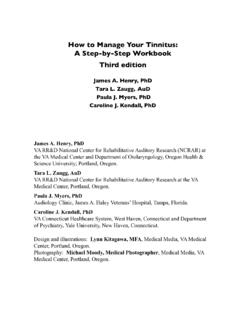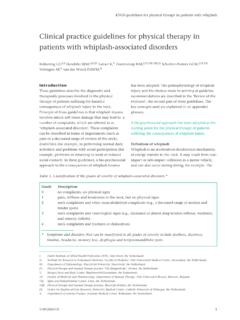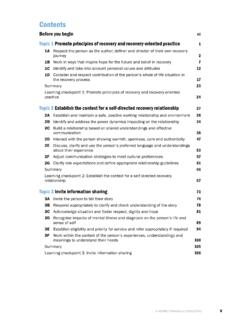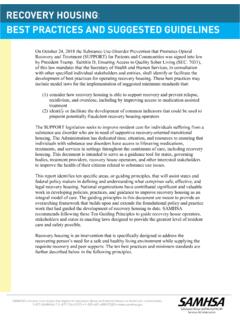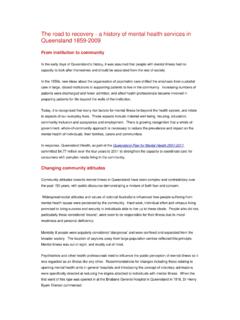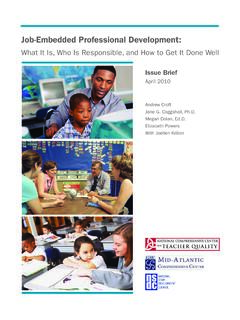Transcription of A triage guide for tinnitus - Veterans Affairs
1 A triage guide for tinnitusRinging in the ears may be symptomatic of a serious condition or it may be benign. Th is guide can help you tell the diff erence. Doctor, I have this ringing in my ears. With an estimated 10% to 15% of adults experi-encing chronic tinnitus ,1 most primary care physicians are familiar with this complaint. Th e prevalence of tinnitus increases with age and with exposure to high levels of noise the most commonly reported With people living longer and such toxic noise levels on the rise, tinnitus is a condition you can expect to encounter even more the prevalence of tinnitus , however, there are no clinical standards or best practice guidelines for managing it.
2 Th us, many physicians are uncertain about what to tell pa-tients with this distressing disorder, and when (or whether) to refer them to specialists. So patients are sometimes told that nothing can be done and that they simply must learn to live with negative messages from a trusted physician can have a detrimental eff ect, causing some patients to stop seeking help and to become increasingly disturbed by What s more, these messages are untrue. Some conditions that result in tinnitus can be treated. And, although tinnitus itself cannot normally be cured, there are numerous interventions and edu-cational strategies that can help patients change their reactions to and learn to cope with the ringing in their ears.
3 We de-veloped this evidence-based review and tinnitus triage guide (TABLE 1) to help family physicians respond appropriately to this distressing, but common, it transient noise, or tinnitus ?Virtually everyone experiences transient ear noise, which is usually described as a whistling sound accompanied by a sensation of sudden temporary hearing ,4 Th ese idio-pathic episodes are usually unilateral, and often accompa-nied by a feeling of ear A. Henry, PhD; Tara L. Zaugg, AuD; Paula J. Myers, PhD; Caroline J. Kendall, PhD; Elias M. Michaelides, MDVeterans Affairs RR&D National Center for Rehabilitative Auditory Research, VA Medical Center, Portland, Ore (Drs.)
4 Henry and Zaugg); Department of Otolaryngology/Head and Neck Surgery, Oregon Health & Science University, Portland (Dr. Henry); James A. Haley VA Hospital, Tampa, Fla (Dr. Myers); VA Connecticut Healthcare System, West Haven (Drs. Kendall and Michaelides); Department of Psychiatry (Dr. Kendall) and Department of Surgery-Otolaryngology (Dr. Michaelides), Yale School of Medicine, New Haven, Conn authors reported no potential confl ict of interest relevant to this RECOMMENDATIONSRECOMMENDATIONS Let patients know that they can learn to manage their reactions to tinnitus with methods that include stress reduction, therapeutic sound, and coping skills.
5 A Refer patients with tinnitus to an audiologist for a hear-ing evaluation, assessment of the tinnitus , and, if indicated, support in learning to man-age reactions to tinnitus . A Give patients with suicidal ideation or extreme anxiety or depression in response to tinnitus a same-day referral to a mental health professional. A Provide an urgent refer-ral to an otolaryngologist or emergency care if you suspect sudden sensorineural hearing loss or another urgent medi-cal condition. AStrength of recommendation (SOR) Good-quality patient- oriented evidence Inconsistent or limited-quality patient- oriented evidence Consensus, usual practice, opinion, disease- oriented evidence, case 59, NO 7 | JULY 2010 | THE JOURNAL OF FAMILY PRACTICE390 THE JOURNAL OF FAMILY PRACTICE | JULY 2010 | VOL 59, NO 7 There is no prescription drug specifi cally for tinnitus , but antidepressants or anxiolytics may relieve associated symptoms of psychological distinguish between tinnitus the perception of sound that is produced inter-nally, rather than by an external stimulus and transient ear noise.
6 Consider the duration and frequency. Transient ear noise generally disappears within seconds (and does not re-quire diagnostic testing or treatment). Tin-nitus, which can have a variety of underlying pathologies, is defi ned as ear or head noise that lasts at least 5 minutes and occurs at least twice a tinnitus is most commonNeurophysiologic (sensorineural) tinnitus , which originates within the auditory nervous system, accounts for the vast majority of cas-es. Th e pathology exists anywhere between the cochlea and the auditory cortex, and ex-cludes any sounds generated by mechanical (somatic) e ringing may be relatively soft; in some cases, it can be heard only in quiet en-vironments or while the patient is trying to sleep.
7 In others, the tinnitus may be constant, interfering with concentration and daily ac-tivities, as well as sleep. In the most severe cases, tinnitus may be associated with severe depression and anxiety, even to the point of suicidal , however, the loudness or other perceptual characteristics of tinnitus do not necessarily indicate the degree to which it is a problem for the Although patients often report that tinnitus interferes with their hearing, they usually also have hear-ing loss, which an audiologic evaluation will medications can trigger or exac-erbate tinnitus , including aspirin, nonsteroi-dal anti-infl ammatory drugs, loop diuretics, TABLE 1 tinnitus triage guide27ED.
8 Emergency the patientRefer toStatus/considerations Has neural defi cits such as facial weakness, head trauma, or other urgent medical conditionOtolaryngology or EDEmergency Has unexplained sudden hearing lossAudiology and otolaryngologyEmergency; must see audiologist prior to otolaryngologist on same day Expresses suicidal ideation or manifests obvious mental illnessMental health or EDMay be emergency;report suicide ideation; provide escort, if necessary Has any of the following: symptoms suggestive of somatic origin of tinnitus (eg, tinnitus that pulses with heartbeat) persistent otalgia or otorrhea vestibular symptoms (eg, dizziness/vertigo)Otolaryngology and audiologyUrgent; schedule otolaryngology exam as soon as possible Has symptoms that suggest a neurophysiologic origin of tinnitus without: ear pain, drainage, or malodor vestibular symptoms sudden hearing loss facial weakness or paralysisAudiology and otolaryngologyNonurgent.
9 Schedule audiology exam before patient sees otolaryngologist triage guide FOR 59, NO 7 | JULY 2010 | THE JOURNAL OF FAMILY PRACTICECONTINUEDTABLE 2 Managing neurophysiologic tinnitus : A range of options2,5,25-27 Cognitive-behavioral therapyElimination of tinnitus -inducing medications (eg, NSAIDs, loop diuretics, and quinine)Hearing aids, sound generators, or other sound devices Lifestyle modifi cations (eg, improve sleep hygiene, exercise regularly, limit salt intake)Medication (antidepressants or anxiolytics)Patient education that stresses that there are numerous techniques that can be used to manage reactions to tinnitus Stress reduction techniques (eg, imagery, meditation, and deep breathing techniques)
10 Therapeutic sound (eg, using interesting sound to direct attention away from tinnitus , low-level background sound to reduce auditory contrast, and soothing sound for relief)and Fairly high doses are usually required to cause tinnitus , however, and the eff ects are typically temporary. Patients have also reported exacerbation of tinnitus due to alcohol, salt, and caff eine intake. Ototoxicity from aminoglycosides and platinum-con-taining chemotherapeutic drugs is a well-known cause of hearing loss and tinnitus , but these eff ects are often ,11 Neurophysiologic tinnitus is gener-ally not serious from a medical standpoint.

